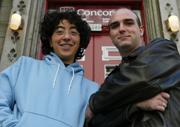 |
 |
|
|
 Deborah Cohen and Sébastien
Fournier say it’s motivating to work with science students from outside
their own area.
Deborah Cohen and Sébastien
Fournier say it’s motivating to work with science students from outside
their own area.
Photo by Andrew Dobrowolskyj
|
by
Sophie Pelland
As an undergraduate physics professor of mine once put it, “The difference
between doing problem sets and doing research is that when you’re doing
research, you don’t know the answer, and you say to yourself, ‘This
isn’t going to work. I need a beer.’ ”
Beer aside, his point is clear: Researchers need to be self-motivated and
to enjoy working on open-ended problems, something that assigned problem
sets with known answers can’t prepare for.
Learning by doing
Michael von Grünau, principal of the Science College, thinks that you
can only learn to do research by “getting your hands dirty” —
actually doing it. This is also the philosophy of the Science College, which
offers undergraduate science students the opportunity to participate in
research projects throughout their studies, either at Concordia or at other
universities or research centres.
Student Sébastien Fournier, who worked with Dr. Marc Hauser at Harvard’s
Primate Cognition and Neuroscience Lab last summer, thinks the Science College
played a key role in creating this research opportunity. In fact, Sébastien
met Dr. Hauser at the Science College when he gave a public lecture at Concordia.
The College also helped Sébastien expand his horizons and consider
doing projects at some of the top research labs in North America.
Like other students in the program, Sébastien is enrolled both in
a regular science program (typically an honours program or a specialization)
and with the Science College. Students in the College are expected to complete
the degree requirements for their department as well as 30 credits with
the Science College. The 30 credits include three research projects, cross-disciplinary
courses designed especially for Science College students, and a six-credit
course in the history, philosophy and social aspects of science.
Deborah Cohen, who joined the College after her second year at Concordia,
especially appreciated her course on the historical, social and philosophical
aspects of science. This seminar-style course dealt with major discoveries
in all fields of science, ranging from black holes to the human genome project.
Besides appreciating the basic science literacy the course offered, Deborah
emphasizes that “all the sciences feed off each other, and anyone who’s
not aware of what’s going on in other fields is missing a piece of
the puzzle.”
Her enthusiasm is shared by Dr. Vesselin Petkov, who taught the course last
year. He was so impressed by his students’ research papers that he
decided to include revised versions in a textbook on major scientific advances
that he plans to edit.
Michael von Grünau joins Petkov in praising the performance of the
Science College students. He wants to win more official recognition for
the Science College program by having it offered as a Minor in Interdisciplinary
Science Studies.
The Science College gives students 24-hour access to its 2080 Mackay St.
building, which has desks, computers and space for studying and relaxing.
Deborah and Sébastien say it’s both useful and motivating to
be able to work with bright students from areas of science other than their
own.
The College runs three lecture series: public lectures by renowned scientists
like Ford Doolittle, who spoke recently; the Montreal Inter-University Seminar
in the History and Philosophy of Science, whose most recent speaker was
Hubert Reeves; and the Montreal Inter-University Physics Seminar. The Physics
Seminar was organized by Dr. Petkov to encourage discussion of open questions
in physics between students and professors from the four Montreal universities.
Petkov is adamant about undergraduate involvement in research: “Once
students start participating in research, they will drop their science fiction
novels. The real thing is much more fascinating!”
|
|
|



